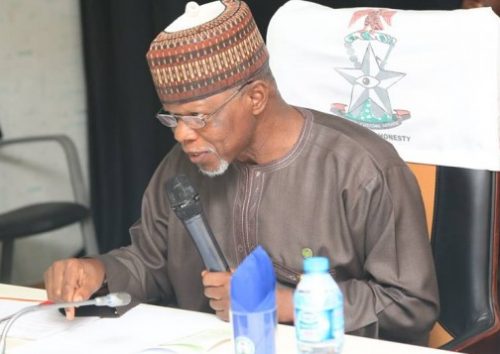
The Nigeria Customs Service (NCS) has banned the use of barges for evacuation of containers from the nation’s seaports, drawing the anger of freight forwarders and other port users.
In a circular signed by Deputy Comptroller General in charge of Enforcement, Inspection and Investigation, DCG A Chidi, a copy of which was sighted by SHIPS & PORTS, the Service alleged that barge operators were abusing the barging to divert containers to “illegal warehouses”.
The circular dated 12th of March and directed to all Area Controllers, Heads of Units, Sector Drill Commanders, Federal Operations Units and the Comptroller-General of Customs (CGC) Strike Force, said the ban takes immediate effect.
The circular reads in part, “The CGC in receipt of intelligence that the use of barges to evacuate containers in and out of our port is being abused to the extent that containers are being diverted to illegal warehouses.
“Consequently, I am directed to inform you that the use of barges to evacuate containers should stop with immediate effect. This is for immediate compliance please.”
Speaking on the development, the Association of Nigerian Licensed Customs Agents (ANLCA) described the ban as “a trade frustrating and wicked policy”.
The association, in a statement signed by its President, Tony Nwabunike on Sunday, while expressing strong opposition to the ban, called on the Customs CG to address the matter through consultation and dialogue with stakeholders rather than a blanket ban.
The association said the directive banning the use of barges to evacuate containers will impede efforts of other government agencies like the Nigerian Ports Authority (NPA) and the National Inland Waterways Authority (NIWA) in find lasting solution to the easy movement of goods through the waterways and to save the roads which are already in deplorable condition.
The statement reads, “It came to us as a surprise when we heard of the unpalatable news that the Comptroller General of the Nigeria Customs Service (NCS), Hameed Ibrahim Ali, has issued a circular banning the use of barges to evacuate containers to and from our seaports with immediate effect.
“More surprising is the fact that the Customs CG preaching trade facilitation and ease of doing business, should not be the one taking hasty decisions that will not only aggravate the current suffering of stakeholders, but also impede on efforts of other government agencies like the NPA, NIWA etc in finding a lasting solution to easy movement of goods through the waterways and to save our roads which are already in terrible deplorable state.
“We in the Association of Nigerian Licensed Customs Agents (ANLCA) are strongly opposed to this position and call on the Customs boss to address the matter through consultations and dialogue with all stakeholders in the industry.
“We in ANLCA, however suggests the following steps to be taken by the Customs CG to address the situation: That the Customs CG should visit Lagos ports to see things for himself; should hold a critical stakeholders meeting to address the issue and hold talks with Managing Directors of NPA, Nigerian Shipper’s Council (NSC) and NIWA on how to manage the situation.
“On our part, a high powered team from ANLCA will visit the Zonal Coordinator of Zone, ‘A’ of the NCS to register our protest and displeasure on this wicked policy. Also, the ANLCA leadership will dispatch a letter to the Customs CG latest by tomorrow (today) to seek the reversal of this trade frustrating policy.
“We want to also assure the Customs leadership that ANLCA as a group of Customs Brokers will do everything possible to see to friendly trade policies that will attract investors to our ports.”
NPA) and NIWA have been championing and encouraging the use of barges for movement and evacuation of cargoes as part of efforts to reduce the pressure on the port access roads and to serve as a solution to the perennial gridlock being experienced on port roads.